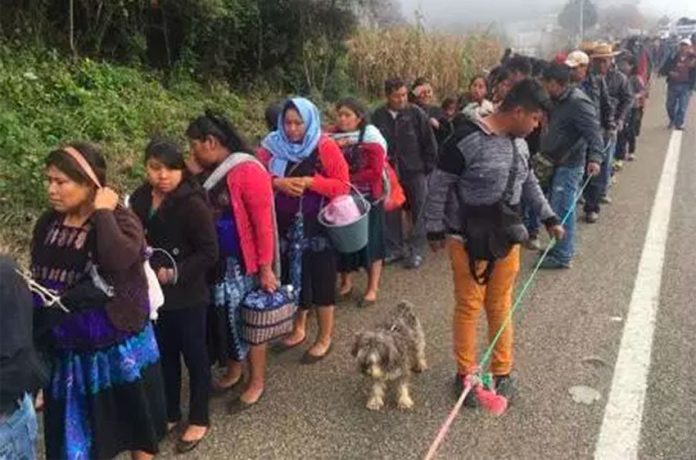Almost 500 indigenous people who have been displaced from their communities in Chiapas due to violence are marching to the state capital to seek a solution from authorities.
The 444 Tzotzil Maya people are from the municipalities of Chenalhó, Ocosingo and Zinacantán but were forced to leave their homes amid violent territorial and political conflicts.
Some have been displaced for more than two years.
The contingent left San Cristóbal de las Casas on Monday and yesterday reached a point 15 kilometers short of the town of Chiapa de Corzo after walking through fog and drizzle in cold temperatures.
The director of the Ku’untick Human Rights Center, Diego Cadenas, who is accompanying the Tzotzils on their “pies cansados” (tired feet) march, said the Chiapas government has made no commitment to restore security in highland communities so that the displaced people can return home.
Javier Hernández, a spokesman for the Chenalhó contingent, said that “as displaced people from the Puebla ejido [community land], we’ve decided to express our disagreement,” adding “until now, our problem hasn’t been solved and we haven’t been able to return [home].”
After setting up camp last night on the side of the San Cristóbal-Chiapa de Corzo highway, where humanitarian aid including food and clothes was distributed, the march towards Tuxtla Gutiérrez resumed today.
State and Federal Police have been escorting the indigenous caravan, which still has around 30 kilometers left to travel, meaning that it will likely arrive in the capital Friday or Saturday.
One of the displaced persons is 30-year-old pregnant woman who is traveling with her husband and two children.
Rosa Gutiérrez García, a Oaxaca native, had only been living in Chenalhó two weeks when on May 26, 2016, armed men attacked residents of the Puebla ejido, forcing Gutiérrez and her family to flee.
A 14-year-old girl was killed in the attack, which was triggered by political differences.
Thousands of indigenous people have fled their homes in the highlands of Chiapas during recent years due to violence stemming from political and territorial disputes.
Deaths due to cold and hunger have occurred in makeshift camps set up by displaced people and a year ago, a human rights organization and the Catholic church described the situation in parts of Chiapas as a humanitarian crisis.
Source: El Universal (sp), Noticieros Televisa (sp)
